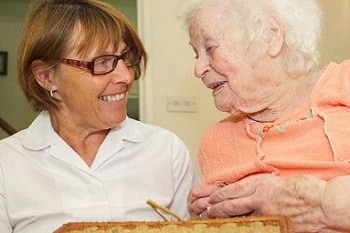Program Helps Older Adults Manage Depression
University of Washington, Prevention Research Center

Background
Minor depression affects 15%–20% of community-dwelling older adults and is known to profoundly compromise health and quality of life. People who are socially isolated and in frail health are especially at risk for depression. Doctors and their older patients often incorrectly assume that depression is an unavoidable consequence of aging, and many depressed older adults do not receive treatment.
Context
For more than 15 years, the University of Washington, Prevention Research Center (HPRC) has collaborated with local organizations to improve the health and quality of life of older adults. In 1998-2003, HPRC worked with colleagues at the City of Seattle’s Aging and Disability Services and Senior Services (a local nonprofit group) to develop and test a program to reduce depressive symptoms among homebound, chronically ill, and frail low-income older adults.
PEARLS programs are operating in 18 states and listed in the National Registry of Evidence-based Programs and Practices.
Methods & Results
HPRC researchers conducted a randomized controlled trial among community-dwelling people over the age of 60 (mean age 73) who had minor depression or dysthymia and were receiving social services from one or both of the collaborating organizations. The PEARLS intervention provided eight one-hour, in-home sessions with a trained social service worker over a 19-week period. Counselors used three depression management techniques: problem solving treatment, in which clients learned to recognize depressive symptoms, define problems that may contribute to their depression, and identify and implement steps to solve their problems; social and physical activity planning; and pleasant event planning. Counselors encouraged participants to use existing community services and participate in local activities. The comparison group received usual care. Participants’ depressive symptoms (such as sadness and lack of energy) and other outcomes were followed for one year.
Comparisons of the 72 people who received the skill-building sessions to the 66 who received usual care showed measurable benefits to older adults who participated in PEARLS. After one year, 43% of the older adults in the intervention group reported at least a 50% decline in depressive symptoms. Only 15% of adults in the control group reported the same decline. Depression resolved completely for 36% of PEARLS participants and 12% of controls. In addition, PEARLS participants experienced significant improvements in functional and emotional well-being.
Consequences
Following the success of this study and subsequent program implementation, HPRC and its community partners developed mechanisms to facilitate program dissemination. These include a comprehensive implementation toolkit that provides technical assistance for program implementation, supervision, data management, and marketing communication; program evaluation data collection instruments; and a three-day in-person training in Seattle. Additional training and support resources are being developed, including an instrument to quantitatively assess fidelity in the domains of training, treatment design, and program delivery.
HPRC is working with the Washington State Department of Social and Health Services to assess the need to implement PEARLS statewide. The goal is to provide access to all program-eligible older adults who receive social case management. The City of Seattle’s Aging and Disability Services has expanded the reach of PEARLS to include older adults from the African American and the Filipino and Chinese immigrant communities. Contracts for program delivery have been established with small community-based organizations that serve those communities.
In addition to several PEARLS program sites in the Seattle/King County area, the program is also being implemented by organizations in Spokane (Washington) and Vermont. Organizations that implement PEARLS continue to collect program outcome data, such as improvements in depression scores, satisfaction with care, quality of life, and physical activity levels.
Impact And Potential Impact
PEARLS is listed in the National Registry of Evidence-based Programs and Practices, a service of the Substance Abuse and Mental Health Services Administration. This Internet-based listing makes information about PEARLS available to communities everywhere.
Participants speak movingly about the many ways they benefit from this program. If shown to be similarly effective in other older populations, this program has the potential to substantially improve health and quality of life for large numbers of dually eligible Medicaid-Medicare clients who have minor depression or dysthymia, and are receiving social case management services. Because PEARLS can be implemented as part of existing community social services programs, eligible older adults can be readily identified and enrolled in the program. Moreover, because most social service organizations have access to mental health experts who can supervise social services staff in their implementation of PEARLS, the program need not require large increases in local funding. Thus, PEARLS has the potential to benefit large numbers of frail and homebound older adults.
Currently, almost 2,200 people have participated in PEARLS, and there are currently 60 active PEARLS programs operating in 18 states.
References
Ciechanowski P, Wagner E, Schmaling K, et al. Community-integrated home-based depression treatment in older adults. Journal of the American Medical Association. 2004;291:1569–77.
Lakey SL, Gray SL, Ciechanowski P, Schwartz S, Logerfo J. Antidepressant use in nonmajor depression: Secondary analysis of a program to encourage active, rewarding lives for seniors (PEARLS), a randomized controlled trial in older adults from 2000 to 2003. Am J Geriatr Pharmacother. 2008;6(1):12–20.
Schmaling KB, Williams B, Schwartz S, Ciechanowski P, LoGerfo J. The content of behavior therapy for depression demonstrates few associations with treatment outcome among low income, medically ill older adults. Behavior Therapy. 2008;39(4):360–365.
Ciechanowski P, Schwartz S, Snowden M et al. PEARLS Toolkit Website. https://depts.washington.edu/hprc/programs-tools/pearls/get-started-with-pearls/pearls-implementation-toolkit/. Accessed November 16, 2018.
NREPP—National Registry of Evidence-Based Programs and Practices. Substance Abuse and Mental Health Services Administration Website. http://www.samhsa.gov/nrepp. Accessed November 16, 2018.
Snowden M, Piering P, Favaro S. Evidence-Based Depression Care Management: Program to Encourage Active, Rewarding Lives for Seniors (PEARLS). Webinar presentation, Prevention Research Centers (PRC) Healthy Aging Research Network (HAN) Webinar Series. https://www.ncoa.org/article/evidence-based-program-pearls-program-to-encourage-active-rewarding-lives Assessed November 16, 2018.